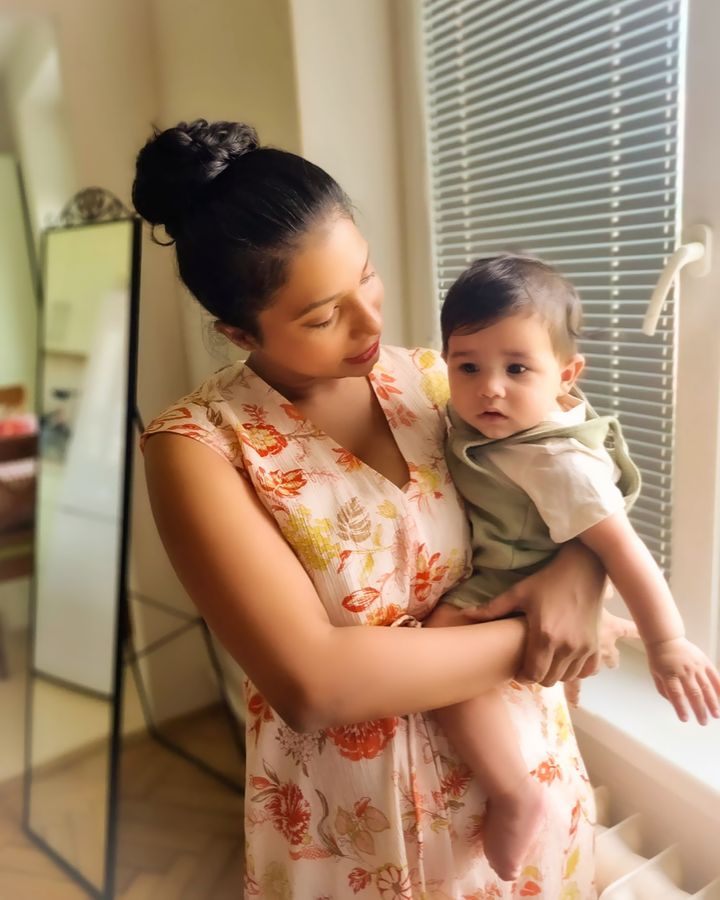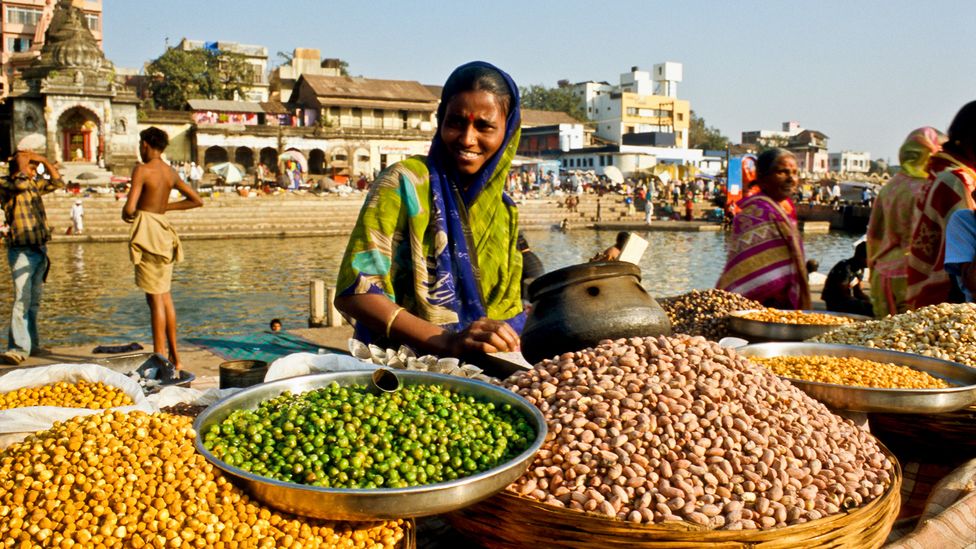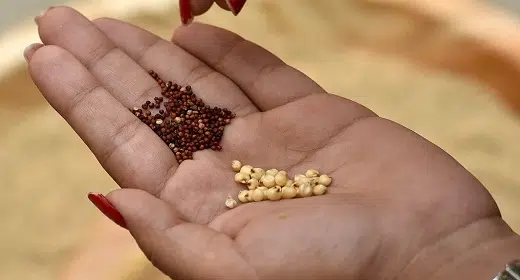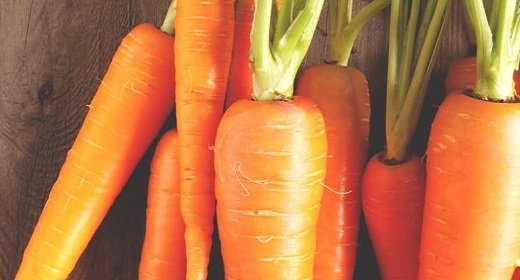by Kamala Thiagarajan: Kamala Thiagarajan investigates what vegan families can learn from India’s ancient tradition of plant-based cooking, coupled with new scientific insights…
In 2010, Ashish Kumar Jain, then 28 and working in the UK as an IT professional, chanced upon an online video that left a deep impact on him. It described the cruelties meted out by the dairy industry, especially to calves. As an expectant parent, and at a time when he was longing to return to India for the birth of his first baby, he says it convinced him and his wife to switch to a vegan diet. Living in Indore, a city in the central Indian state of Madhya Pradesh, the couple decided to raise their child as a vegan, too.
Today his daughter Arul is a healthy, fit 11-year-old and an ardent vegan advocate herself. Raising her as a vegan child wasn’t as stressful as addressing concerns from extended family about these choices, says Jain. One factor made the transition particularly easy, he says: India’s long history of meat-free cooking. While that tradition tends to be vegetarian rather than vegan, it holds useful lessons on maximising the nutritional power of plant-based meals – which could benefit the growing number of vegan adults and children not just in India, but around the world.
researchers thought was concerning was the vegan children’s lower bone mineral density
While vegan kids were 3cm (1.2in) shorter on average, it didn’t mean that they were stunted in growth or would always stay short, says Jonathan Wells, professor of anthropology and paediatric nutrition at UCL and another co-author of the study.
“Vegan kids had less fat mass, and tended to weigh less. It’s possible that they would reach puberty a little later. We’ve seen that children who reach puberty later actually extended their growing period because they grow for more years,” says Wells. So there was a potential for these kids to grow taller as adults.
The only finding that the researchers thought was concerning was their comparatively lower bone mineral density.
“The bone reaches its optimal density by the early 20s. And so, if you don’t build bone density at the time, you’re not going to be able to do that later,” Wells says. Those who have lower bone mineral density in adulthood will feel its impacts in older age, making them more vulnerable to diseases like osteoporosis as bones slowly grow more brittle. “So vegan diets may have changed the profile of disease that people are more at risk to as they age,” says Wells. “Instead of cardiovascular disease [heart disease], they may be prone to bone disease (weaker bones). But it’s not like they’re unhealthy now.”
Some of the study’s findings were surprising. For example, the vegetarian children tended to eat more junk food like pizza and soft drinks – a reminder that a vegetarian diet doesn’t in itself guarantee a healthy, balanced menu. As might be expected, omnivores had the highest estimated intake of protein, and vegans the lowest – but vegetarians had the highest estimated intake of calcium. (Vegans, it turns out, had the lowest).
And nearly a third of children on either vegetarian or vegan diets in the study were not given any B12 supplements or B12–fortified foods – even though such supplements are commonly recommended for people on a plant-based diet. The Academy of Nutrition and Dietetics in the US for example states that well-planned vegetarian and vegan diets are appropriate for all life stages, including pregnancy, infancy and childhood. But it also adds that vegans need to ensure they take vitamin B12, be it in the form of supplements or fortified foods.
One possible conclusion is that some of these real-life plant-based diets could have had better results, had they included more nutritious ingredients. Or, as the authors state in the paper: “Vegan and vegetarian children need guidelines on how to eat healthfully, beyond advice on supplementation.”
More generally, studies of plant-centred diets – so, vegetarian, not just vegan – tend to conclude that they are safe for children. A longitudinal study of children aged from six months to eight years in the US found there was no evidence of clinically meaningful differences in growth or nutritional status for children with a vegetarian diet, compared to their peers. However, the vegetarian kids (the sample also included vegans) faced higher odds of being underweight. The German Society for Paediatric and Adolescent Medicine also took an overall positive stance in a 2019 paper on vegetarian (including vegan) diets for children and teens, stating that “the nutritional needs of growing children and adolescents can generally be met through a balanced, vegetable-based diet”, though it adds that a vegetarian diet in childhood and adolescence requires supervision by a paediatrician, and that vegans should supplement B12.
A meat-based diet may also harbour risks of its own, due to the hormones found in meat and milk – though the evidence on this is mixed. “In intensive farming, concentrations of estrogens in milk are higher due to long milking periods,” state the authors of one review of studies on estrogens in cow’s milk and their potential health effects. They point out that exposure to these hormones can impact children, and disrupt their development in ways that may only become evident in adult life, for example, through a lower sperm count. However, they also argue milk has a number of health benefits. The review concludes that while the amounts of estrogens in cow’s milk are too low to affect the health of adult humans, more research should be done on the impact on children, especially during the earliest stages of development.

Vegan mum Bhavya Chandra Prem with her son. Prem followed a vegan diet while she was pregnant, with protein-rich lentils, legumes and tofu (Credit: Bhavya Chandra Prem)
FAMILY TREE
This article is part of Family Tree, a series of features that explore the issues and opportunities that parents, children and families face all over the world. You might also be interested in other stories in the series:
- The surprising benefits of baby massage
- What really happens when babies are left to cry it out?
- How Covid changed a kids’ virus
You can also climb new branches of the Family Tree on BBC Worklife and BBC Culture – and check out this playlist on changing families by BBC Reel.
Back to the roots
In recent years, the global spotlight has often been on plant-based novelties such as vegan cheese or meat-free burgers, which have made it easier for many to switch to a more plant-centred diet. But the focus on these eye-catching innovations can risk missing other ingredients that have been around for centuries – and which could fill some of the potential nutritional gaps of vegan family meals.
Bhavya Chandra Prem, a 33-year-old technical engineer who grew up in the Kunnur district of the Southern Indian state of Kerala, grew up on a predominantly non-vegetarian diet of beef, chicken stew and parathas (an Indian flat bread). She turned vegan almost overnight in 2014 after moving to Sydney for university, when a vegan friend and housemate asked her “Why would you want to kill and eat something you love?” A little research showed her the horrific realities of the meat and dairy industry. “I watched a few documentaries like Cowspiracy, Earthlings and I couldn’t live a lie and consume meat or diary or fish products. I have been vegan ever since and I haven’t looked back,” says Prem, who now lives in the Czech Republic.
In 2020, when she learnt that she was pregnant, she had to contend with terrible morning sickness until 22 weeks, and could barely keep anything down except crackers, rice and soup. When that phase passed, she started seeking out healthier and nutrient-dense vegan food with the support of her husband, who is Italian. Her gynecologist said that following a vegan diet wouldn’t harm their growing child, as long as she ate high-protein foods.
“I ate different types of dals (split pulses), lentils and legumes and tons of vegetable soups, tofu and soy products,” she says. Her favourites were cherupayaru (a curry made with mung beans), and Kerala-style stews, which typically include coconut milk.
In November 2021, her baby boy was born at a healthy 3.6kg (7.9lb), and he is doing well, Prem says. While she adds she doesn’t want to impose her own ethical values on her son, she will expose him to more diverse foods beyond meat as he grows older.

Traditional Indian grains and pulses can enrich a vegan diet (Credit: Getty Images)
Protein-rich foods
Edwina Raj, a clinical dietician at the Bengaluru-based Aster CMI hospitals, points out that India’s traditional foods offer plenty of options for vegans. “We’ve seen that some vegans tend to rely too heavily on refined flours and carbohydrates,” she says. “Instead, they’ll need to focus on complex carbs. We suggest the many varieties of unpolished rice – red, brown, black. As a vegan parent, you’ll need to keep in mind the dietary requirements for protein are 1g per kg of body weight and plan your meals accordingly.” She recommends millets, lentils, dried green peas and beans as sources of high-quality protein.
Karla Moreno-Bryce (MDA, RD, LD), a vegan Pediatric Nutrition Coach based in Minneapolis, in the US argues that regardless of the family’s chosen cuisine, planning healthy vegan meals can be relatively easy.
“Meal prepping for vegan kids just requires a little attention to ensure that key nutrients (iron, zinc, iodine, omega-3s, calcium, Vitamin D, and Vitamin B12) are offered during the day through a variety of plant foods and dietary supplements,” she says. “It’s particularly important that all vegan kids receive a reliable Vitamin B12 supplement, preferably at the time they begin solid foods. This is a nutrient that naturally lacks in plant foods and a supplement, in addition to fortified foods, is the most reliable source of meeting this important nutrient
With the right mix of ingredients, she says, parents can offer healthy vegan versions of many different cuisines: “Many vegan parents focus on ensuring that their children’s meals consist of vegetables, and while they are important and provide an array of nutrients, they lack the calories to support a child’s growth and development. I encourage vegan parents to focus on providing foods rich in iron (such as beans, lentils, and tofu) and fat (such as avocado and nut butters) since these are two important nutrients during periods of rapid growth,” says Moreno-Bryce.
To meet his growing vegan child’s nutritional needs in India, Ashish Kumar Jain has turned to locally grown leafy vegetables, like local spinaches, methi (fenugreek leaves), cumin seeds, coriander, and curry leaves, as well as nutrient-dense sesame seeds, tofu and finger millet. He substitutes milk with extracts from almonds and coconuts, makes “cheese” from cashews and potatoes, and yoghurt from peanut milk.
“We’ve never felt deprived of dairy,” he says. “And there are many reasons to prioritise veganism that go beyond diet and health – compassion for animals, climate and sustainability. Veganism is a social justice movement, as much as it is a healthy choice.”
* Disclaimer: All content within this article is provided for general information only, and should not be treated as a substitute for the medical and dietary advice of healthcare professionals. The BBC is not responsible or liable for any diagnosis or actions taken by a user based on the content of this site. The BBC is not liable for the contents of any external internet sites listed, nor does it endorse any commercial product or service mentioned or advised on any of the sites. The BBC encourages anyone interested in making dietary changes to consult their healthcare provider beforehand. Always consult your own GP if you’re in any way concerned about your health or the health of your child.
This article has been corrected to state that Bhavya Chandra Prem studied in Sydney, not Spain.
















































